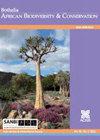Bactérias isoladas do nim Azadirachta indica (Meliaceae) sobre adultos de Spodoptera frugiperda (Lepidoptera, Noctuidae)
IF 0.5
4区 生物学
Q4 PLANT SCIENCES
引用次数: 0
Abstract
This study aimed to evaluate the pathogenicity of bacteria isolated from the neem plant, Azadirachta indica (Meliaceae), on adults of Spodoptera frugiperda (Lepidoptera, Noctuidae). All evaluated bacterial suspensions were calibrated to a concentration of 5.0 x 108 cells / mL. The evaluated adults were the survivors of caterpillars that ingested corn leaves treated with bacterial suspensions. With these surviving adults, couples were formed and kept in cages. The longevity of males and females, the period of pre-oviposition and fertility, the total number of laying, fertility and fertility of the females were verified. Of the total isolates evaluated, 64.0% of them caused some adverse effect on adults, to the point of affecting one or more of the observed variables. The ingestion of bacteria by caterpillars reduced the longevity of adults, male and female. Females had a reduction in the fertile period, in the number of postures, in fertility and fertility. Only the pre-oviposition period was not affected. The Bacillus sp. Epi 9, Bacillus subtilis and Nim 10 isolates are highlighted because they affect the largest number of variables evaluated. The results obtained in this work are promising and important, as this is the first report of bacteria isolated from neem with pathogenic action to S. frugiperda.从印楝(印楝科)中分离到frugiperda夜蛾(鳞翅目,夜蛾科)成虫上的细菌
本研究旨在评价从印楝属植物印楝科(Azadirachta indica)分离的细菌对夜蛾(Spodoptera frugiperda,鳞翅目,夜蛾科)成虫的致病性。所有被评估的细菌悬浮液都被校准到5.0 × 108个细胞/ mL的浓度。被评估的成虫是幼虫摄入经细菌悬浮液处理的玉米叶片后的幸存者。这些幸存下来的成年企鹅结成一对,关在笼子里。验证了雄、雌的寿命、产卵前期、产卵期、产卵总数、雌的繁殖力和繁殖力。在所有被评估的分离株中,64.0%的分离株对成人造成一定的不良影响,影响到一个或多个观察变量。毛毛虫摄入的细菌减少了成年男女的寿命。女性的排卵期、体位数量、生育能力和生育能力都有所减少。只有产卵前不受影响。芽孢杆菌sp. Epi 9,枯草芽孢杆菌和Nim 10分离株被突出显示,因为它们影响评估的变量数量最多。这项工作的结果是有希望的和重要的,因为这是第一次报道从楝树中分离出的对frugiperda具有致病性的细菌。
本文章由计算机程序翻译,如有差异,请以英文原文为准。
求助全文
约1分钟内获得全文
求助全文
来源期刊

Bothalia
生物-植物科学
CiteScore
1.70
自引率
0.00%
发文量
12
期刊介绍:
Bothalia: African Biodiversity & Conservation is published by AOSIS for the South African National Biodiversity Institute (SANBI) and aims to disseminate knowledge, information and innovative approaches that promote and enhance the wise use and management of biodiversity in order to sustain the systems and species that support and benefit the people of Africa.
The journal was previously published as Bothalia, and had served the South African botanical community since 1921. However the expanded mandate of SANBI necessitated a broader scope for the journal, and in 2014, the subtitle, African Biodiversity & Conservation was added to reflect this change.
 求助内容:
求助内容: 应助结果提醒方式:
应助结果提醒方式:


